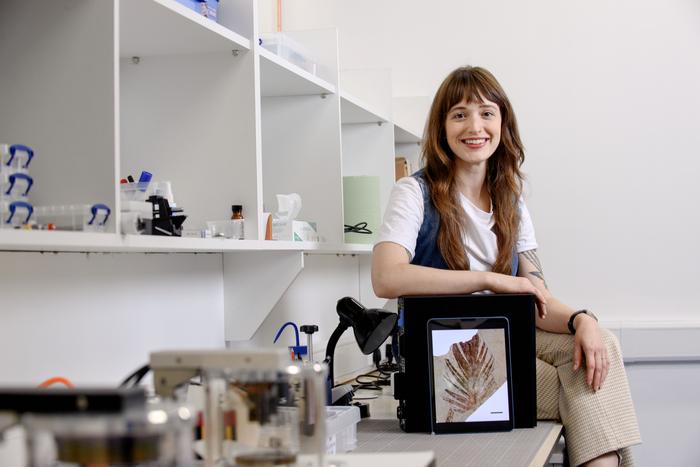Palaeontologists at University College Cork (UCC) in Ireland have discovered X-ray evidence of proteins in fossil feathers that sheds new light on feather evolution.

Credit: Daragh Mc Sweeney/Provision
Palaeontologists at University College Cork (UCC) in Ireland have discovered X-ray evidence of proteins in fossil feathers that sheds new light on feather evolution.
Previous studies suggested that ancient feathers had a different composition to the feathers of birds today. The new research, however, reveals that the protein composition of modern-day feathers was also present in the feathers of dinosaurs and early birds, confirming that the chemistry of feathers originated much earlier than previously thought.
The research, published today in Nature Ecology and Evolution, was led by palaeontologists Dr Tiffany Slater and Prof. Maria McNamara of UCC’s School of Biological, Earth, and Environmental Science, who teamed with scientists based at Linyi University (China) and the Stanford Synchrotron Radiation Lightsource (USA).
The team analysed 125-million-year-old feathers from the dinosaur Sinornithosaurus and the early bird Confuciusornis from China, plus a 50-million-year-old feather from the USA.
“It’s really exciting to discover new similarities between dinosaurs and birds,” Dr Slater says. “To do this, we developed a new method to detect traces of ancient feather proteins. Using X-rays and infrared light we found that feathers from the dinosaur Sinornithosaurus contained lots of beta-proteins, just like feathers of birds today.”
To help interpret the chemical signals preserved in the fossil feathers, the team also ran experiments to help understand how feather proteins break down during the fossilization process.
“Modern bird feathers are rich in beta-proteins that help strengthen feathers for flight,” Dr Slater says.
“Previous tests on dinosaur feathers, though, found mostly alpha-proteins. Our experiments can now explain this weird chemistry as the result of protein degradation during the fossilization process. So although some fossil feathers do preserve traces of the original beta-proteins, other fossil feathers are damaged and tell us a false narrative about feather evolution.”
This research helps answer a long-standing debate about whether feather proteins, and proteins in general, can preserve in deep time.
Prof. Maria McNamara, senior author on the study, said
“Traces of ancient biomolecules can clearly survive for millions of years, but you can’t read the fossil record literally because even seemingly well-preserved fossil tissues have been cooked and squashed during fossilization. We’re developing new tools to understand what happens during fossilization and unlock the chemical secrets of fossils. This will give us exciting new insights into the evolution of important tissues and their biomolecules. “
ENDS
Journal
Nature
DOI
10.1038/s41559-023-02177-8
Method of Research
Imaging analysis
Subject of Research
Animals
Article Title
Preservation of corneous β-proteins in Mesozoic feathers
Article Publication Date
21-Sep-2023
COI Statement
None




